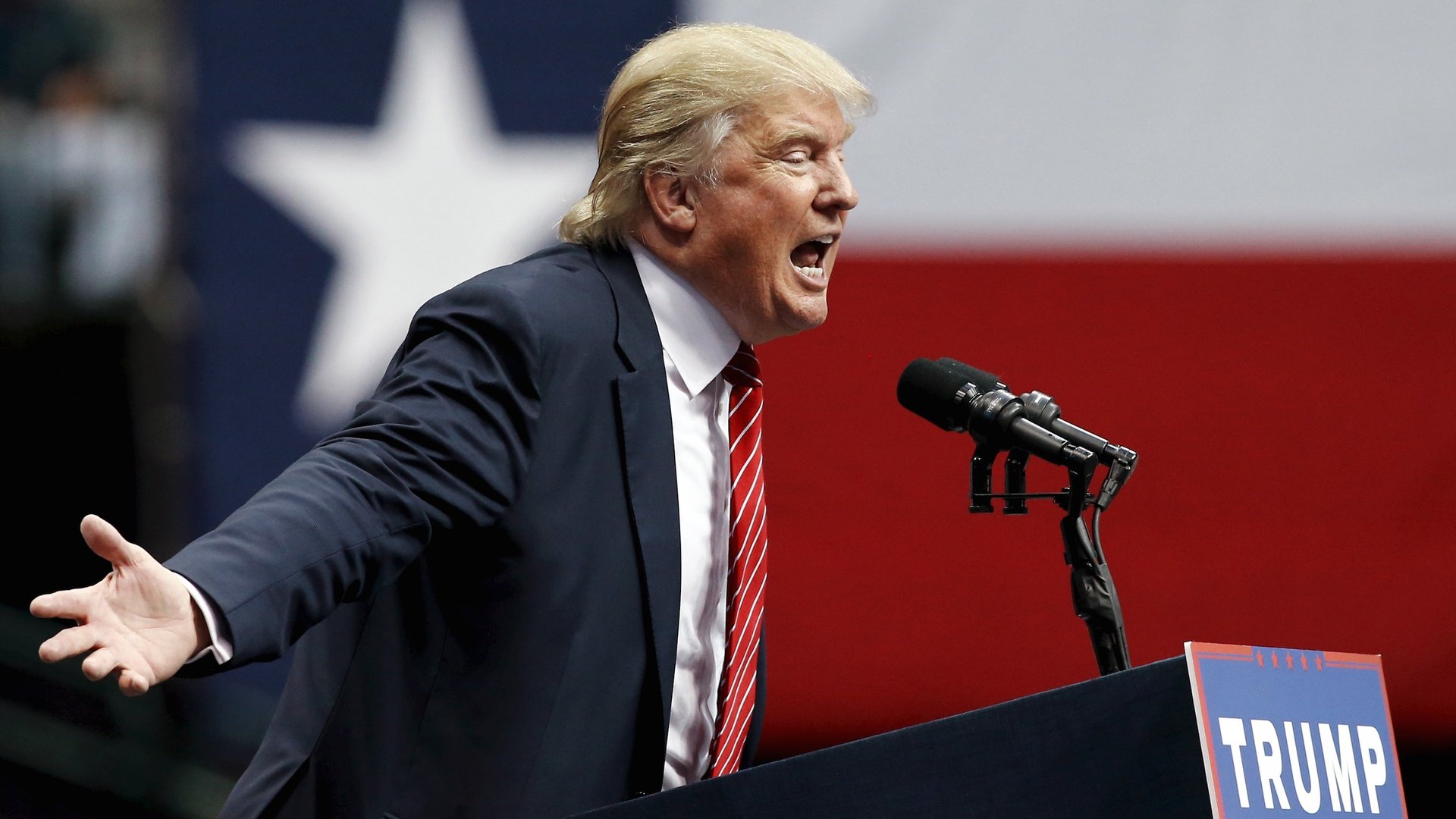The greatest trick The Donald ever pulled
Republican presidential hopeful Donald Trump has confounded a nation. Despite a checkered resume and an ideologically erratic record, he improbably appeals to American conservatives of all stripes.


Trump has fooled the GOP into thinking brashness is bravery
Republican presidential hopeful Donald Trump has confounded a nation. Despite a checkered resume and an ideologically erratic record, he improbably appeals to American conservatives of all stripes.
For instance, why, after three divorces, a Playboy cover, and years of flip-flopping on hot-button issues like abortion and gay marriage, is Trump so darn popular with evangelical Christians?
“He’s a guy who is out there unfettered by the political correctness,” Tony Perkins, president of the Family Research Council, a conservative Christian advocacy organization, told The Boston Globe. “He’s not afraid to say what he thinks.”
Even dissatisfied alumni of Trump’s shady for-profit business school, some of which are involved in pending lawsuits against the real-estate mogul, admire his candor. “He says what he means, not like politicians, not like Obama,” Louie Liu, a Texas motel owner, who claims to have been scammed out of nearly $25,000 by Trump University, told The Washington Post.
“I’m liking the things that Trump is saying because we have too much whitewash,” a Trump supporter at the Iowa State Fair told Defense One. “My son said something recently that was very unlike my son, and I said, ‘Douglas! You know we don’t talk like that about people!’ and he says, ‘I know, Mom, but I’ve had to be so politically correct for the past 25 years, sometimes I just have to say it like is.’”
Do you, Douglas? Do you? I’m no doctor, but the last time I checked, my human body requires oxygen, water, and food to survive. Personal expression without consequence is just gravy.
In the second Republican primary debate, Trump, to great applause, declared that political correctness is “destroying” America. He is correct. It is destroying an America—a version of this country that has been fighting a slow, painful death since Lyndon B. Johnson’s signing of the Civil Rights Act in 1964. And probably before.
In the new, emergent America, the white, heterosexual, Christian male is no longer the default powerbroker. Or his time is limited, at least. He can no longer say or do whatever he pleases without fear of reprisal, or—God forbid—criticism. And this is the trend the average Trump supporter, consciously or otherwise, is bucking so ferociously against. (Who can blame them? It’s been almost eight years since we’ve had a white guy in the Oval Office!)
Of course, it’s very unlikely that the average Trump voter has ever made any special effort to be politically correct. But this is not the central hypocrisy of Trump-brand “telling it like it is.”
Since the Founding Fathers first put quill to parchment, sketching out the First Amendment, there have been Americans—those blindly enamored with the sound of their own voices—who equate any semblance of a clap back with a violation of free speech; those to whom freedom is freedom only insofar as it pertains to the individual. Our friend Douglas is a prime contemporary specimen.
Contrary to the right-wing mythos, there is not one federal agency devoted to censoring the Douglases of America into a rhetorical prison of political correctness. There are no laws against calling Mexicans “rapists,” or making lazy jokes about Carly Fiorina’s looks. There are, however, plenty of observant Americans perfectly willing to loudly and unapologetically correct an ignorant remark. Some of them aren’t even white! Or male! (The gall!)
This, it apparently merits explaining, does not constitute oppression in any sense of the word. And swallowing offensive opinions for the sake of avoiding confrontation is, if not simply a sense of propriety, merely self-censorship.
There is, therefore, nothing particularly special about Donald Trump “saying what he thinks.” Because, despite what right-wing culture warriors would have you believe, there is no actual obstruction to saying stupid, offensive things in America. Anyone with a Twitter account can tell you how easy it is.
It was one very famous white man—the definitive white man, some might say—who said, “Everyone is in favor of free speech. Hardly a day passes without its being extolled. But some people’s idea of it is that they are free to say what they like, but if anyone else says anything back, that is an outrage.” Thanks, Winston Churchill.
It is the supreme height of entitlement—and a scorching indictment of broader American attitudes—that an entire presidential campaign, and an alarmingly successful one at that, is wholly fueled by anxiety of criticism. It is a troubling indication of how the Republican party has devolved from a movement committed to national advancement, to a bubbling sludge of childish angst.
But more frightening is the core delusion at work. Because here, there is no Great Wall of Political Correctness to scale, no army of thought police to defeat. There are simply literate, critically-thinking people who have discovered—despite the establishment’s purposeful obfuscations—that their speech is just as protected by the Constitution as Donald Trump’s; and they are no longer bound by cultures of white supremacy, patriarchy, or respectability, which might have previously dictated that they ignore or pretend to accept efforts to perpetuate ignorance and discrimination.
That version of America is on its way out. And the emergence of Trumpismo is likely one of its final, sputtering flameouts; a sociological death throe. And death throes are rarely quiet things. The Trumpistas, with their fiery commitment to “saying what they think” are ensuring this one is no different.